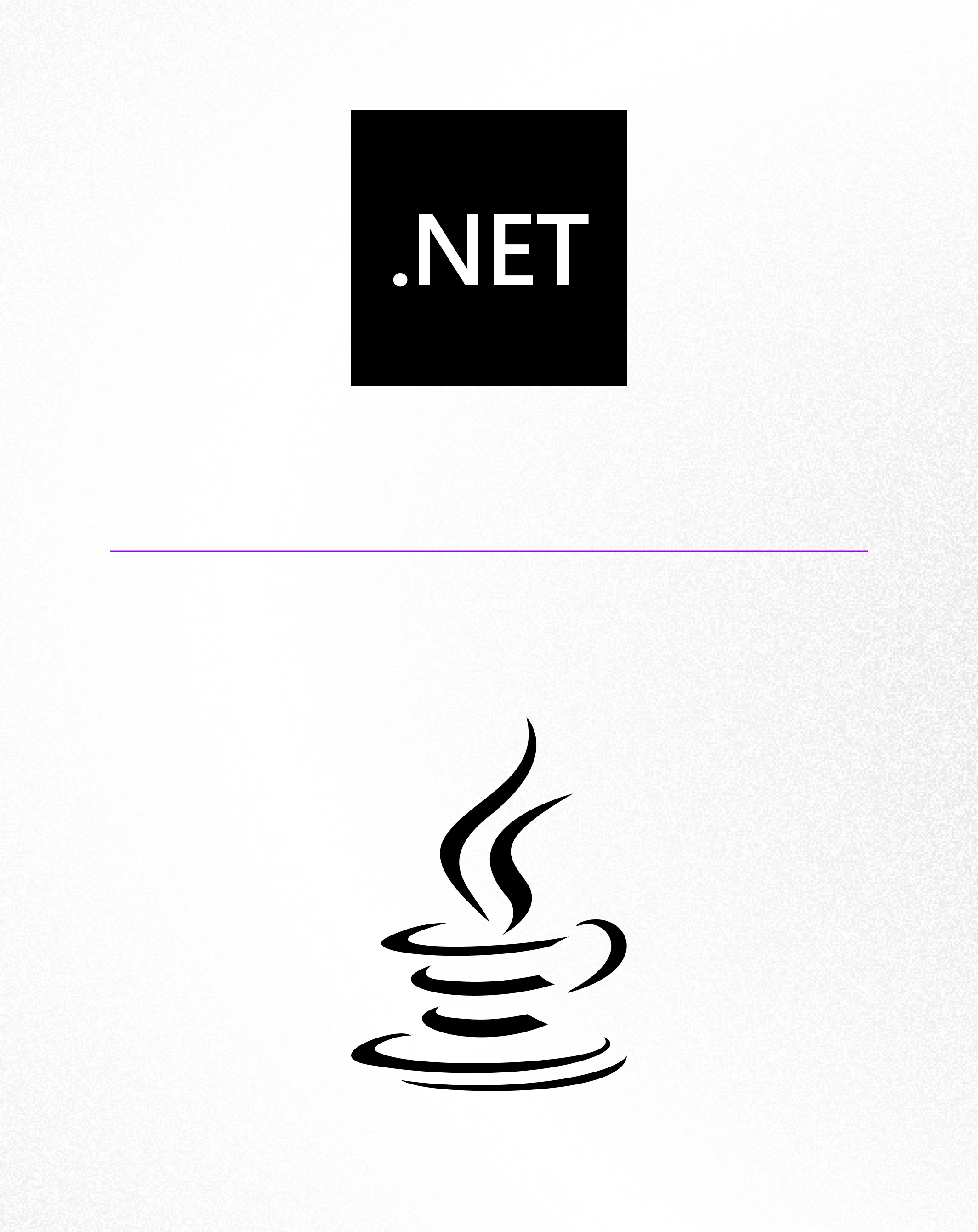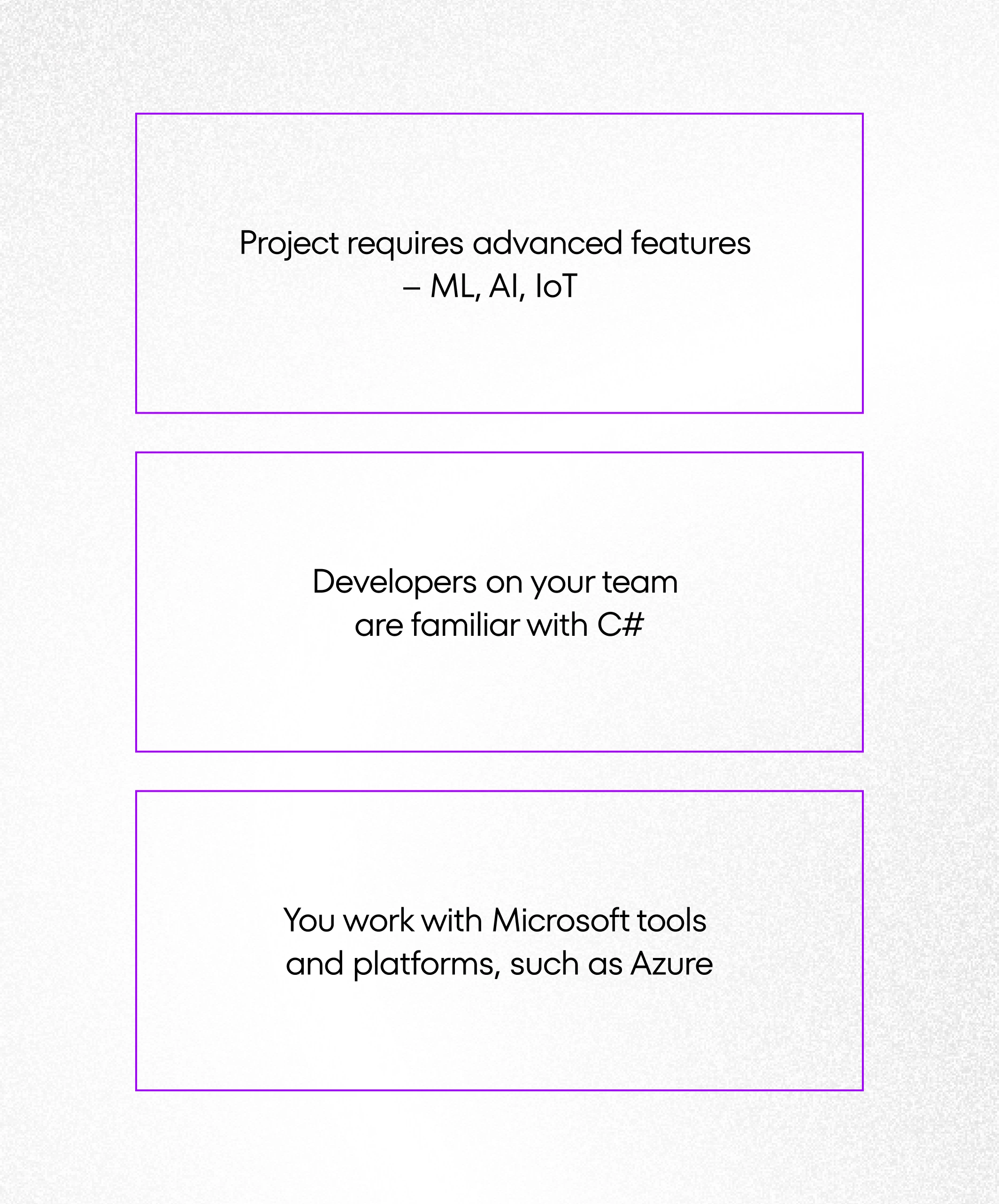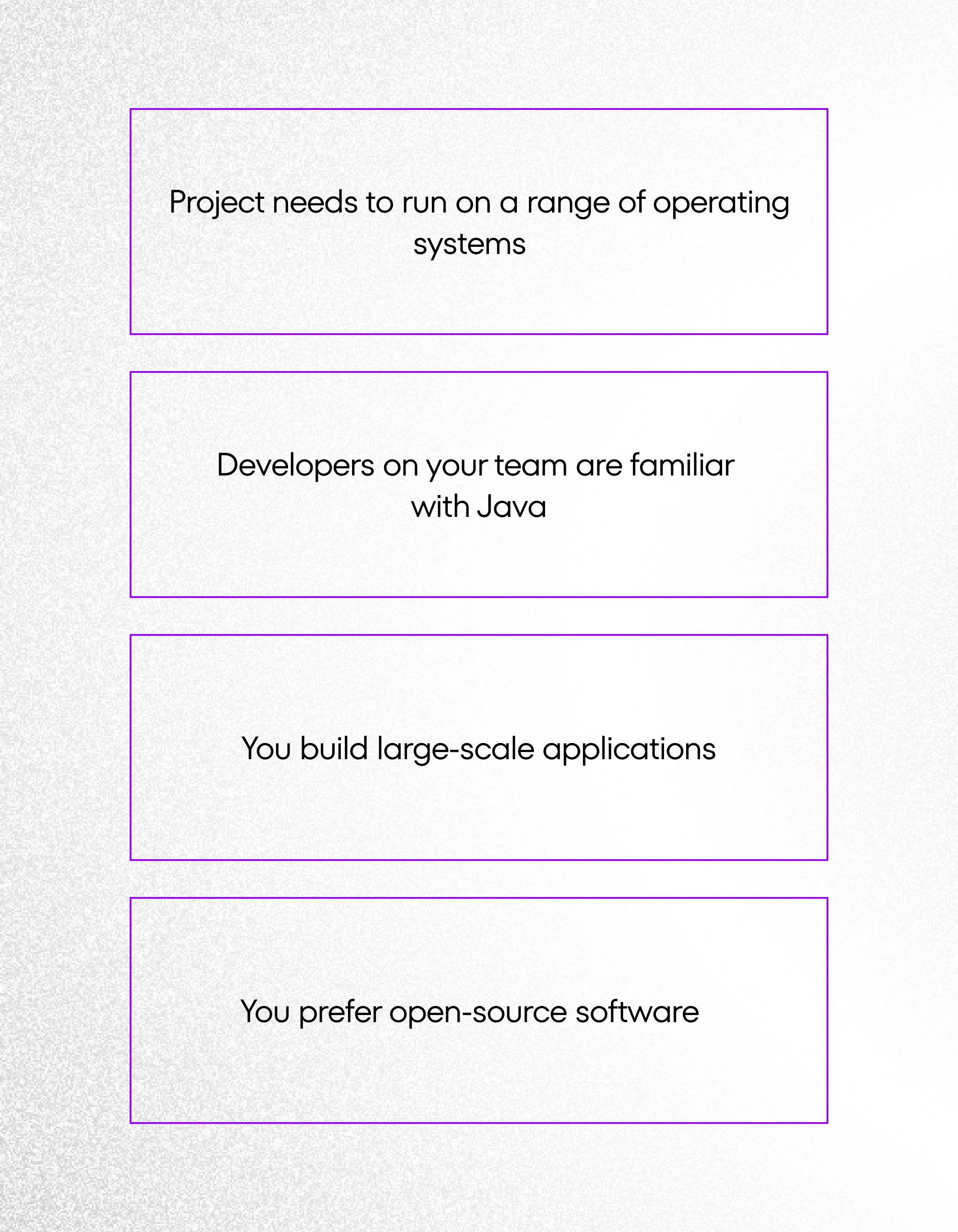March 2nd, 2023 | by CSHARK
.NET vs Java: Key Differences and Which One is Better?

Table of contents
Choosing the right programming language for your project is like picking the perfect tool for a job.
With a selection of options available, it’s challenging to determine which will produce optimal results in your particular case in terms of performance, workability, development timeframes, ongoing costs, and more.
To help you make this crucial choice, we’ve broken down 2 industry leaders: .NET and Java.
In this article, we’ll explore and compare different aspects of these 2 platforms, namely their:
- languages and runtimes,
- cross-platform capabilities,
- tooling and IDEs,
- performance,
- communities and ecosystems,
- costs and licensing;
- we’ll cover the scenarios of when it’s better to choose .NET, and when it’s better to opt for Java in your software projects,
- we’ll end with a recap of .NET and Java similarities and differences.


Like two heavyweight contenders in a boxing ring, these platforms have their unique strengths and weaknesses. By the end of this comparison, you’ll better understand which one will power up your next venture.
Language and Runtime of .NET vs Java
.NET Language and Runtime
Microsoft’s .NET framework is the foundational platform for various software products, and as of 2021, it has been used to build over 60 million apps.
At the foundation is its Common Language Runtime (CLR), responsible for vital tasks such as memory management and exception handling. It additionally aids in performance by deploying a Just In Time compiler, so code can be converted into machine-readable form.
.NET provides developers with a wide range of programming language options to create applications, from C# and Visual Basic .NET to F# and beyond. All code written for the CLR has assured compatibility across languages due to its reliable execution model.
.NET is a popular choice for many due to its extensive library of pre-built components. This comprehensive class library covers an enormous range, giving users all they need in one powerful package. From desktop applications to web services – or anything in between – .NET provides an accessible means for development that has made it one of the most sought-after frameworks out there.
Java Language and Runtime
Java is one of the most popular programming languages and computing platforms in the world, with an estimated 9 million developers using it. It’s developed by Sun Microsystems, (now owned by Oracle) and designed to be platform-independent, meaning that Java code can be run on any system with a Java Runtime Environment (JRE) installed.
With the JRE, developers are provided a comprehensive platform to build and deliver applications. The JRE features virtual machine technology (JVM) that can interpret and execute code smoothly on any platform. Plus, it provides libraries of valuable functionalities like input/output management, networking protocols, and graphics manipulation for even easier development.
Java offers developers the flexibility to write code once and run it anywhere. Through its strongly typed object-oriented design and syntax similar to C++, it allows for the development of anything from desktop software to web services. And it does it while maintaining high performance across different platforms thanks to compilation into byte code compatible with any system running a JRE.
Comparison of .NET vs Java Languages and Runtimes
Java and .NET support different programming languages and use different runtimes — CLR and JVM (check the table below).

Both .NET and Java have rich class libraries that provide a wide range of functionality, including I/O, networking, and security. Tools and frameworks for debugging and profiling applications (visual debuggers, profilers, memory analysis tools) are available for either platform.
Cross-Platform Development of .NET vs Java
.NET Cross-Platform Capabilities
.NET has come a long way from being a Windows-only framework and has evolved into a cross-platform framework that can be used to develop scalable applications on a wide range of platforms, including:
- Windows,
- macOS,
- Linux,
- ARM-based devices, such as Raspberry Pi.
This was made possible through the development of .NET Core – an open-source, modular implementation of the .NET framework.
Thanks to .NET Core, developers can craft software solutions for use in a variety of contexts, such as:
- desktop software,
- web applications,
- cloud-native applications,
- IoT (Internet of Things) devices.
The cross-platform capabilities of .NET Core allow developers to write code once and run it on multiple platforms, which makes development faster and more efficient.
Microsoft has also empowered .NET developers with powerful tools and frameworks. For example, Visual Studio Code is a lightweight and cross-platform code editor that supports .NET Core development. Azure, Microsoft’s cloud platform, also provides a range of services that can be used to develop, deploy, and scale .NET applications on the cloud.
Java Cross-Platform Capabilities
Java is known for its “write once, run anywhere” capability, which means that its programs can be written on one platform and run on any other platform that has a Java Virtual Machine (JVM) installed.
This cross-platform capability is one of Java’s key features, making it one of the most popular programming languages in the world.
The JVM interprets the Java byte code and executes it on the target platform, regardless of the underlying hardware and operating system. This means that Java programs can be run on platforms such as:
- Windows,
- macOS,
- Linux,
- various mobile platforms.
In addition to the JVM, Java has a rich set of class libraries that provide a wide range of functionality, including I/O, networking, and security. They are platform-independent, which means that they can be used on any platform that supports the Java platform.
Furthermore, Java’s cross-platform capabilities have been extended by the development of JavaFX. This cross-platform toolkit can be used to develop desktop and mobile apps with a rich graphical user interface. JavaFX provides a high-level API for creating user interfaces and has built-in support for 2D and 3D graphics, animation, and multimedia.
Comparison of .NET vs Java Cross-Platform Capabilities
Both .NET and Java have strong cross-platform capabilities that enable developers to write code once and run it on multiple platforms.

Tooling and IDEs of .NET vs Java
.NET Tooling and IDEs
Let’s take a look into what can be used for developing, testing, and deploying .NET applications.
Visual Studio
- the primary IDE for .NET development,
- supports multiple programming languages – e.g. C#, VB.NET, F#,
- provides a wide range of tools and integrations to support development workflows,
- has a built-in debugger, profiling tools, and testing framework.
Visual Studio Code
- a lightweight and cross-platform code editor,
- supports multiple programming languages – e.g. C#
- includes features such as debugging, IntelliSense, and Git integration.
JetBrains Rider
- a cross-platform IDE that provides a comprehensive set of features for building, debugging, and testing .NET applications
- supports multiple programming languages – e.g. C#, VB.NET, F#,
- includes features such as refactoring, unit testing, and code analysis.
.NET CLI (Command Line Interface)
- a cross-platform tool that provides a command-line interface for building and deploying .NET applications
- supports multiple platforms and programming languages,
- can be used in conjunction with a variety of editors and IDEs.
NuGet
- a package manager for .NET that provides a centralized repository for packages and libraries,
- allows developers to easily install, manage, and update dependencies for .NET applications.
Docker
- containerization platform that provides a lightweight and portable environment for running .NET applications
- widely used for testing, deployment, and scaling of applications.
Java Tooling and IDEs
Whether working in a large team or as an individual developer, Java developers also have access to a wide range of resources to support their development workflows.
Eclipse
- an open-source, cross-platform IDE,
- includes a set of features for Java development, including syntax highlighting, code completion, and debugging tools,
- supports a wide range of plugins for different programming languages, frameworks, and libraries.
IntelliJ IDEA
- a popular commercial IDE for Java development
- provides a set of features for building, testing, and deploying Java applications,
- includes a powerful code editor, advanced refactoring tools, and built-in support for frameworks such as Spring, Hibernate, and Struts.
NetBeans
- an open-source IDE for Java development,
- provides a set of features for building, testing, and deploying Java applications,
- includes a code editor, visual design tools, and support for different programming languages and frameworks.
Maven
- a build automation tool for Java projects,
- provides a framework for building, testing, and deploying Java applications,
- includes a rich set of plugins for different libraries and frameworks,
- widely used by Java developers to manage project dependencies.
Gradle
- another popular build automation tool for Java projects,
- provides a flexible and powerful framework for building, testing, and deploying Java applications,
- includes a set of plugins for different libraries and frameworks,
- provides a modern and intuitive build script language.
JUnit
- a popular testing framework for Java applications,
- provides a simple and powerful API for writing unit tests,
- includes support for testing different types of applications,
- provides a range of features for testing and asserting the behavior of Java code.
Comparison of .NET vs Java Tooling and IDEs
Both .NET and Java have various tools and IDEs available to developers. In the table below, you can see some of the key differences.

.NET vs Java Performance
While both .NET and Java are relatively fast, there are differences in performance depending on the specific application and hardware.
One of the main factors contributing to both platforms’ performance is their Just-In-Time (JIT) compilation. .NET and Java use a combination of compiled and interpreted code to optimize performance. When a .NET application is first executed, it’s compiled into an intermediate language (IL) that’s platform-independent. The IL is then compiled into machine code at runtime by the JIT compiler, which optimizes the code for the specific hardware and operating system.
Another factor contributing to the performance of .NET and Java is the use of a garbage collector, which manages memory allocation and deallocation automatically. This helps reduce memory leaks and improve the application’s overall performance.
When evaluating the performance of both frameworks, it’s also necessary to take into account:
- language features – .NET and Java support different programming languages, and the performance of an application can be affected by the features and syntax of the language being used,
- platform dependencies – .NET and Java’s performance can be affected by the platform and operating system they are running on, i.e. .NET can take advantage of Windows-specific optimizations, while Java can be optimized for specific operating systems.
Overall, both .NET and Java are highly performant platforms, and it’s important to benchmark and profile applications to identify performance bottlenecks and optimize accordingly.
Community and Ecosystem of .NET vs Java
.NET Community and Ecosystem
Microsoft has embraced open source in recent years. This has led to the development of a large and growing community around .NET, with contributions from developers and organizations around the world. Over 1.7 million developers are using .NET and there are over 100,000 active contributors on GitHub.
The .NET ecosystem includes a vast array of commercial libraries and frameworks that provide developers with pre-built tools and components for building applications. Some popular .NET libraries and frameworks include ASP.NET, Entity Framework, and Xamarin.
The community is highly active and supportive, with a range of online forums, user groups, and conferences available for developers to connect, share knowledge, and collaborate.
Some key elements include:
- .NET Foundation – a non-profit organization that promotes the open development of the .NET platform, provides resources, guidance to the community, and oversees many of the key open-source projects.
- Community events – including user groups, meetups, conferences, and hackathons- provide developers opportunities to learn, network, and share their knowledge and experiences with peers.
Java Community and Ecosystem
Java is open-source and has enabled global collaboration among developers and organizations. This enriches the available resources of frameworks, libraries, tools, and platforms for various projects – all free to use.
Java developers benefit from an extensive set of open-source frameworks and libraries, offering them the tools to build high-quality apps. Some popular Java frameworks and libraries include Spring, Hibernate, Struts, Apache, and Eclipse.
And obviously, Java has a vibrant community with developers, users, and organizations worldwide contributing to its ecosystem.
Here are some of its key aspects:
- Java Community Process (JCP) – a collaborative effort that allows the Java community to participate in the evolution of the platform; enables developers and organizations to submit proposals for new features or enhancements to the Java platform, which are then reviewed and approved by a group of experts.
- Java User Groups (JUGs) – communities of Java developers who meet regularly to discuss Java-related topics, share knowledge and experiences, and network with each other; they’re spread worldwide and offer a great way to connect with other Java enthusiasts.
- Java Conferences – held around the world, offering a platform for Java developers to learn about new developments in the Java ecosystem; they provide a space to network with peers and share experiences and expertise.
Comparison of .NET vs Java Communities and Ecosystems
Both .NET and Java have vibrant communities and ecosystems that offer many resources and support to developers. Below are some comparisons.

Costs and Licensing of .NET vs Java
.NET Cost and Licensing
.NET is a free, open-source development platform maintained by Microsoft. This means that developers can download and use the .NET platform and related tools without incurring any direct costs.
However, some components of .NET aren’t open source, and Microsoft offers commercial versions of some of its tools licensed for a fee. For example, Visual Studio (the primary IDE for .NET development) has both a free Community edition (free for individuals, small teams, and open-source projects) and a paid Professional and Enterprise edition designed for larger teams and organizations.
In addition, some components of .NET, such as the .NET Framework, may require a license if they’re used in a commercial setting. The licensing terms for these components vary depending on the specific use case, and you should consult Microsoft’s licensing documentation for more information.
Java Cost and Licensing
Java is likewise open source and free to use, download, and distribute – you can freely use it to develop applications without paying any licensing fees.
Yet, there are some costs associated with using Java in production environments. For example, if you want to use certain Java technologies, such as Java SE Advanced or Java SE Suite, you need to pay for a commercial license. These licenses provide additional features, tools, and support not available in the free version.
In addition, there are some third-party tools and libraries that you may need to purchase to use with Java, depending on your specific application requirements.
Comparison of .NET vs Java Costs and Licensing
Both .NET and Java are free and open-source, and you can use them to develop applications without paying any licensing fees. However, costs apply to commercial licenses available for certain advanced features and support options.

Both platforms have large communities of developers and third-party vendors offering libraries and tools. Some are free, while others are commercial and require a license.
And don’t forget about the cost of hosting and deploying .NET and Java apps. The 2 platforms can be implemented via multiple hosting options – from Cloud to On-Premise solutions – and associated investments will depend upon chosen platform type as well as hardware/software resources needed for operational success.
When to Choose .NET for the Project?
Considering all the factors, here are 3 scenarios when .NET may be a better choice to best meet the needs of your project.
.NET will be better when…


- If your project requires advanced features such as machine learning, AI, or IoT. .NET offers powerful tools and libraries for these advanced features, such as the ML.NET machine learning framework.
- If you work with Microsoft tools and platforms, such as Azure or Visual Studio. .NET is tightly integrated with them, so it’s easy to develop and deploy applications within this ecosystem.
- If you have developers on your team who are already familiar with C#. It’s the primary language used with .NET and is similar to Java in terms of syntax, making it relatively easy to learn for those already familiar with Java.
When to Choose Java for the Project?
In turn, here are some situations where you might choose Java over .NET.
Java will be better when…


- If your project needs to run on a wide range of operating systems. Java is designed to be platform-independent, meaning it can run on various operating systems, including Windows, Linux, and macOS.
- If you build large-scale applications that require high performance and scalability. Java offers features such as garbage collection and just-in-time compilation, which can help to optimize performance and scalability.
- If you prefer to use open-source software. Java is an open-source language, and many open-source libraries and frameworks are available that can help speed up development and reduce costs.
- If you have developers on your team who are already familiar with Java. Java is a widely-used programming language, and many developers are already familiar with its syntax and features.
Choose Wisely
When the time comes to select a platform for enterprise development projects, .NET and Java both offer excellent capabilities.
Consider the existing skill sets of your team members, underlying infrastructure, and project requirements (such as interoperability needs and end-user environment) to make an informed decision that will ensure success.
Rapid results may point towards .NET, whereas larger-scale projects could suggest going with Java.
However, whatever choice you make, it has the potential to achieve great outcomes.
Recap of .NET vs Java Similarities and Differences
Whether you’re a developer, a CTO, or just a tech enthusiast, we understand that the choice between .NET and Java can be tough.
Their unique capabilities and features make it easy to get lost in a sea of similarities and differences.
To make it more manageable for you, see the table below for a recap of key differences between .NET and Java.

While both languages share similarities, such as their open-source nature and active developer communities, they also have significant differences in their language, operating system compatibility, performance, and tooling. By understanding these key differences, you’ll make an informed decision allowing you to create scalable applications for your needs.
Conclusion
Choosing between .NET and Java usually comes down to factors such as performance, development environment, and available third-party libraries.
If you have experience with C# and are in need of rapid development, then .NET may be a better choice. However, if you need to run on a variety of operating systems, have familiarity with Java, or require high scalability, then Java may be a better choice.
Ultimately, the best solution will depend on your project’s unique needs and your team’s expertise.
Whether you’re building web applications, large-scale enterprise systems, or advanced machine learning models, there’s a platform out there that’s perfect for your needs. So choose wisely, and happy coding!
If you need help developing your next endeavor in .NET or Java, contact us and tell us the details.
FAQ
Which is More Popular – .NET vs Java?
According to some measures, Java is more popular than .NET. The TIOBE Index, ranking programming languages based on their popularity among developers, currently lists Java as the 2nd most popular language, while .NET is listed at #6. The PYPL Index, measuring the popularity based on Google search data for programming tutorials, lists Java as the most popular language, with .NET listed at #5.
What Are the Examples of Companies Using .NET vs Java?
Some of the notable companies that use .NET for their development needs include Microsoft, Accenture, T-Mobile, HCL Technologies, Stack Overflow, GoDaddy, Siemens, Dell, and Adobe. Java is also used by many companies across various industries. e.g. Amazon, Google, Netflix, Facebook, LinkedIn, Uber, eBay, Airbnb, and Oracle.
Which Platform is a Better Choice for FinTech Projects?
Both .NET and Java are widely used for developing FinTech projects, and both have their pros and cons. Ultimately, the platform choice will depend on your project’s specific requirements and constraints. Some factors to consider are performance, security, availability of libraries and tools, and developers’ skills and experience. We can help you make an informed decision – let’s talk.


